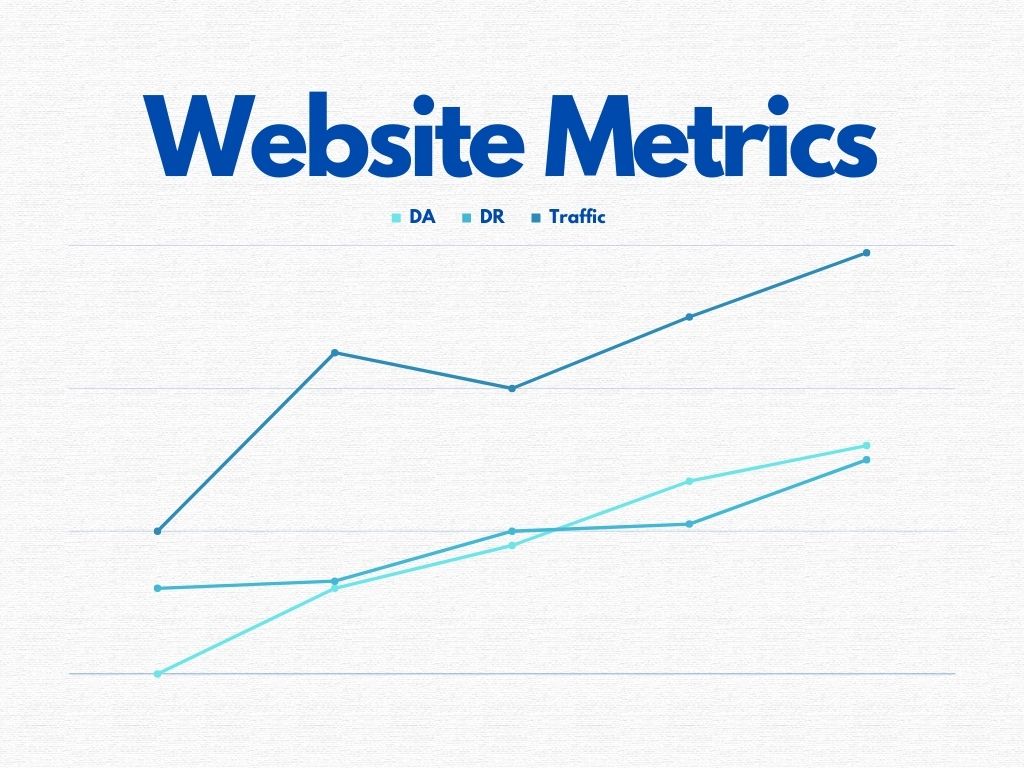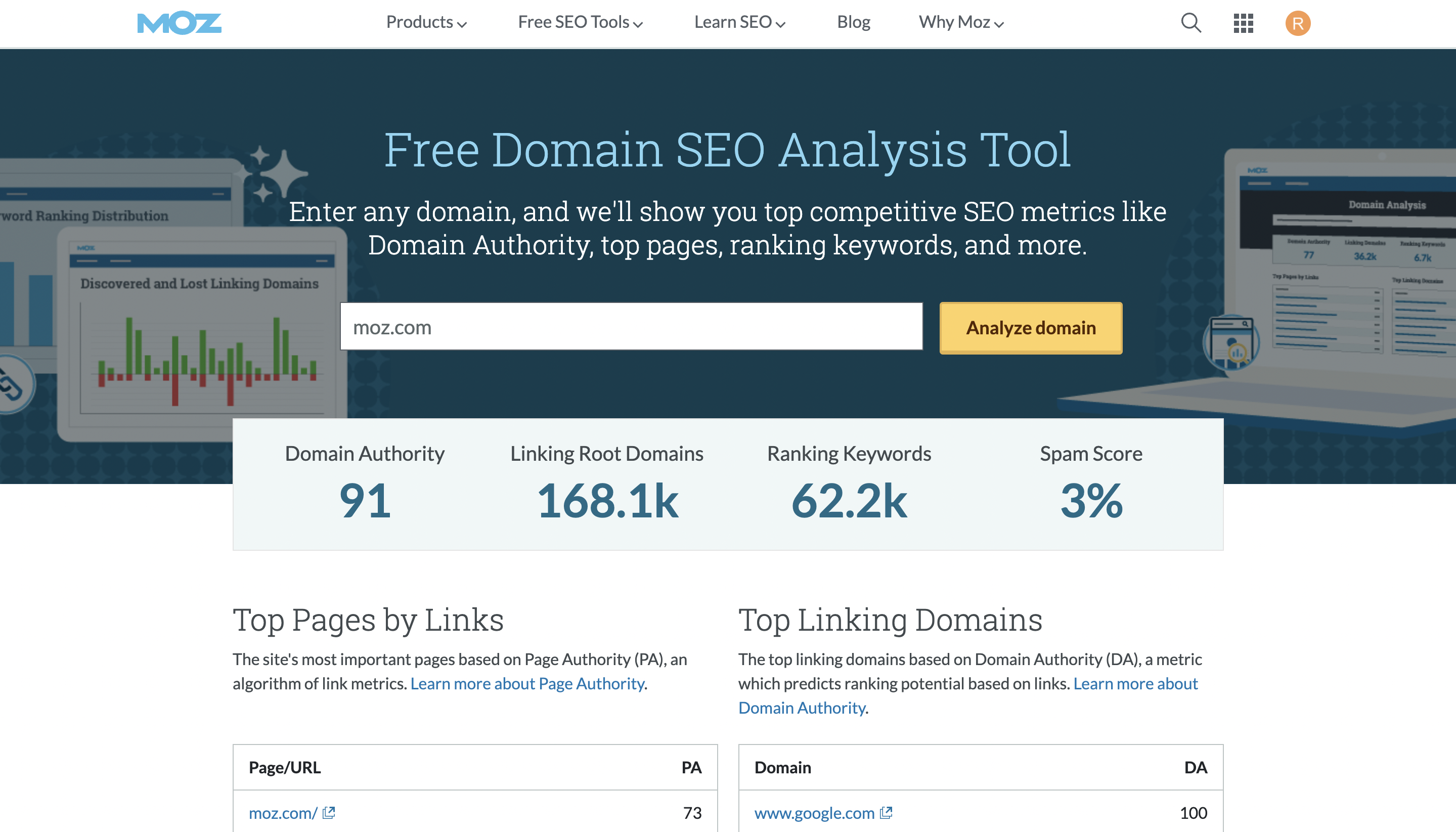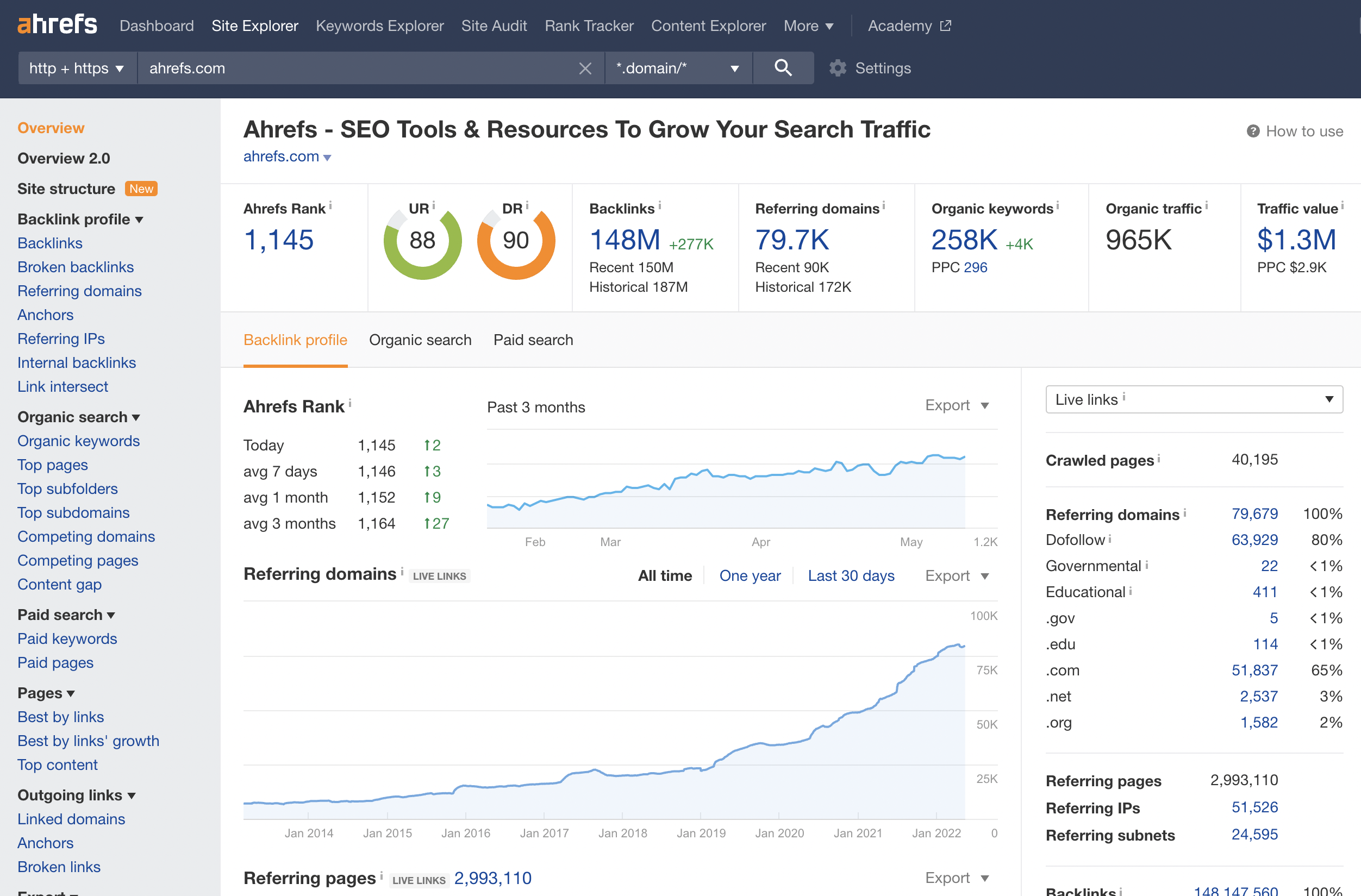
So, you have just launched a new website. But how can you make it a success?
To make sure your website runs successfully, you will need to understand the metrics that are most important. Right off the bat, understanding the most important metrics of your website – domain authority, domain rating, and website traffic – will help you make your it a success.
Our guide on improving your website metrics will help you gain an understanding of what metrics are important to your site and how you can develop these metrics further. This should set you on the right track to making your website a success.
Domain authority (DA) is a metric used to determine how likely a website is to rank in search engine result pages (SERPs). Originally developed by SEO and data management software Moz, this metric can range from one to 100, with the higher authority sites believed to rank higher.
As DA is logarithmic, it is easier for a site to improve from 10 to 20 than it is 50 to 60. The higher your site gets in DA; the more link juice is needed to move up another point.
DA is determined by several factors, including the number and quality of links that are pointing to your website.

Domain authority is important because it helps you to determine the strength of your website and its ability to rank in search engines. As you strive to create a website that ranks well, improving your domain authority should be one of your main goals.
But DA isn’t a ranking factor for Google. Moz stated that DA “is not a metric used by Google in determining search rankings and has no effect on the SERPs.”
However, this doesn’t mean that DA is unimportant. It has been argued that, even though DA may not be a direct ranking factor, it correlates with and could be indirectly influencing your website’s ranking.
There are some things that you can do to improve your website’s domain authority, like:
Building more high-quality links is the most effective way to improve your domain authority. Link building is the process of acquiring links from other websites to your own. You should aim to build links as close to the homepage of a website as possible, as these links increase DA than a link buried deep in a site would. This is one of the features that OutreachPete ensures on every link built for clients.
There are a few ways that you can go about building links, such as:
If you want to improve your domain authority, then you need to focus on building high-quality links.
Publishing more high-quality content is also a great way to improve your domain authority indirectly. Content is the backbone of any website and it’s what will ultimately drive traffic and engagement.
When creating content, you should focus on creating pieces that are:
If you can create high-quality content that is relevant to your target audience, then other websites are more likely to link back to your site as a trustworthy source. This will help you on your way to improving your domain authority.
Improving the overall quality of your website is important for improving your domain authority, too, although this is also an indirect result. Your website should be easy to navigate, fast-loading, and free of errors.
It should contain high-quality content and be designed in a way that is appealing to your target audience. If you can improve the overall quality of your website, then you will be in a good position to improve your domain authority. This is due to more people trusting your site and then building backlinks to it.
To check your site’s DA, you can use Moz; it should know best as the creator of this metric. You can do this by either using the Moz website or downloading the Moz toolbar extension.
Domain rating (DR) is a metric used by Ahrefs; it shows the strength of a website’s backlink profile. Similar to domain authority, domain rating is a metric that ranges from one to 100, with the higher ratings believed to be more authoritative and trustworthy. Similar to domain authority, domain rating is also logarithmic.
Like domain authority, domain rating is determined by several aspects, such as the number of links pointing to your website, the quality of those links.

Domain rating is important because it helps you to understand the strength of your website’s backlink profile. This is important because your backlink profile is one of the biggest factors that determine your website’s ranking in search engines.
A strong backlink profile is essential for ranking well in search engines. So, if you want your website to rank well, then you need to focus on improving your domain rating.
To improve your website’s DR, you should follow the ways outlined to improve domain authority. This includes building more high-quality links, publishing more high-quality content, and improving the overall quality of your website. Both the content and quality of the website can indirectly improve DR; your site will be viewed as more reliable and trustworthy, meaning more people will want to link to your site as a resource.
The former is a task that you can receive help with by buying the services of a blogger outreach agency. OutreachPete, for example, has a team of writers producing original content specifically for clients; these articles are then published on third-party sites that are relevant to the client’s niche. This allows for the most sustainable improvements to a site’s backlink portfolio.
You can check domain rating by using the Ahrefs Site Explorer tool. This tool lets you see the strength of a website’s backlink profile and domain rating. You will need to create an account with Ahrefs to use the tool.
Website traffic is the number of visits to your website and is often the metric webmasters focus on. It’s easy to see why this metric is important; after all, if no one is visiting your website, then you won’t be able to achieve your goals.
However, website traffic is just one metric that you should be focusing on. While it’s important to drive traffic to your website, you also need to make sure that the traffic you are driving is of high quality.
This is where metrics like website conversion rate come into play. So, you should aim to understand the several different metrics that can be included to produce a better overview of the website’s traffic.
There are four main categories of traffic sources:
Organic traffic is users searching for keywords related to your website. This means that they are already interested in what you have to offer.
Referral traffic is users clicking on a link to your website from another site.
Direct traffic is users typing in your website’s URL or bookmarking your website.
Social traffic is users clicking on a link to your website from a social media platform.
Another metric that you should consider when looking at website traffic is the number of new vs returning visitors.
New visitors are users who are visiting your website for the first time. They are often the result of users clicking on a link to your website from another site or search engine.
Returning visitors are users who have visited your website before. They are often the result of users typing in your website’s URL, bookmarking your website, or performing a branded or navigational organic search.
You should aim to have a mix of both new and returning visitors to your website.
Bounce rate is the percentage of users who leave your website after only viewing one page. A low bounce rate is an indication that your website is relevant to the user’s needs and that they are engaged with your content.
A high bounce rate is often an indication that your website is not relevant to the user’s needs.
However, it is important to remember that there are exceptions to this rule on bounce rate. For web pages targeting information or a clear question, a high bounce rate could mean the searchers have found the answer to their query. They have come to the page, received their answer, and left.
Average time spent on site is the amount of time that a user spends on your website before leaving. A high average time spent on site is an indication that your website is relevant to the user’s needs and that they are engaged with your content.
A low average time spent on site is an indication that your website is not relevant to the user’s needs. It might also mean your website is focusing on simple and low-value queries.
Conversion rate is the percentage of website visitors who take the desired action, such as making a purchase or signing up for a newsletter.
This metric is important because it helps you to understand how effective your website is at converting visitors into customers or subscribers.
If you have a high website conversion rate, then it’s likely that you are doing a good job of targeting your audience and providing them with what they are looking for. Conversely, if you have a low website conversion rate, then it’s likely that you need to improve your website to increase conversions.
There are a number of things that you can do to improve your website’s conversion rate, including:
Once you start improving your conversion rate, you can use Google Analytics to set and track your goals. You can also use Google Optimize to do experiments that track which version of pages are achieving the most conversions. Doing so will help you to measure your progress and determine what is working and what is not.

Although building backlinks and producing good quality content is essential to improve website traffic, there are other ways to improve your website’s traffic, such as:
Optimizing your website for search engines is probably the most effective way to improve your website’s search traffic. Search engine optimization (SEO) is the process of optimizing your website to rank higher in search engines.
There are different ways that you can optimize your website for search engines, including:
Promoting your website on social media is also a great way to improve your website’s traffic. Social media is a powerful platform that can be used to drive traffic to your website.
There are a number of things that you can do to promote your website on social media, like:
If you want to improve your website’s traffic, then you need to focus on promoting your website on social media.
Promotion on other websites’ social media pages is also a possibility. This can be achieved by building backlinks from blogs and such, as some bloggers will share articles from their sites on their social media. It is easier to do if you have a relationship with the blogger, and outreach agencies, like OutreachPete, have these contacts already.
If you want to improve your website’s traffic, then you need to update your SEO strategy. SEO is an ever-changing field and what works today might not work tomorrow.
So, it’s important to stay up-to-date with the latest SEO news and trends. There are several ways that you can stay up-to-date with the latest SEO news and trends, including:
If you want to improve your website’s traffic, then it is essential to keep your SEO strategy up-to-date.
There are a number of ways that you can check your website’s traffic, including:
Google Analytics is a free tool that can be used to track your website’s traffic. This tool will show you how much traffic your website is receiving, where that traffic is coming from, and what pages on your website are being viewed.

Google Search Console is another free tool that can be used to track your website’s traffic. The Search Console will show you how much traffic your website is receiving from search engines, what keywords are being used to find your website, and what position your website is ranking in the search results.
A website traffic tracker is a tool that can be used to track your website’s traffic. Website traffic trackers will show you how much traffic your website is receiving, where that traffic is coming from, and what pages on your website are being viewed.
There are various website traffic trackers that you can use, including:
With all of this in mind, improving the metrics of your website should be easier than ever before. Just remember to focus on the most important metrics for your website, such as domain authority, domain rating, and website traffic. Using OutreachPete to build high-quality backlinks on sites relevant to your industry should help, too.
Once you have developed these metrics, your website will be well on its way to becoming a success.
Every month we give away 2 platinum tier links to new subscribers of our newsletter.
Sign up now for helpful outreach/link-building tips and exclusive discounts
* By entering the monthly prize draw, you agree to subscribe to updates from OutreachPete via email, you can unsubscribe at any time
Every month we give away 2 platinum tier links to new subscribers of our newsletter.
Sign up now for helpful outreach/link-building tips and exclusive discounts
* By entering the monthly prize draw, you agree to subscribe to updates from OutreachPete via email, you can unsubscribe at any time